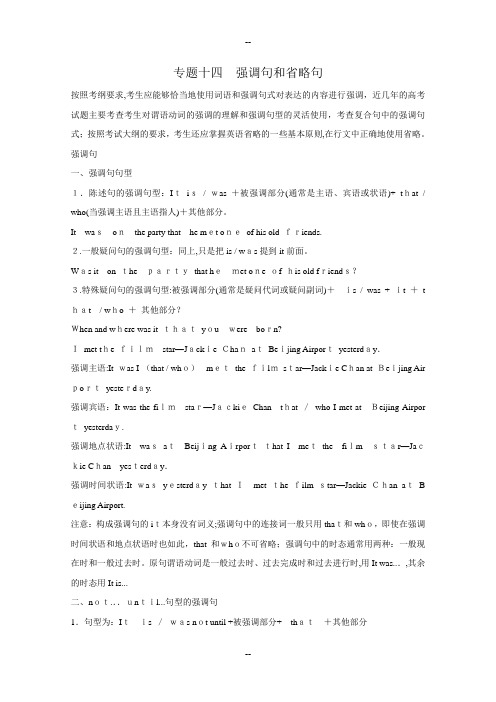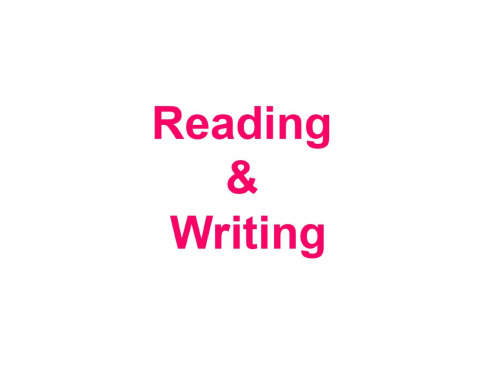高三英语上学期秋季同步教材第一讲 省略
- 格式:doc
- 大小:52.50 KB
- 文档页数:5


二十一、省略1and连接的句子在由and连接的句子中,为避免重复常省略一些重复的词或词组。
⒈省略共同的主语或宾语。
如:Mr. Smith picked up a coin in the road and (Mr.Smith)handed it to a policeman.⒉若主语不同而谓语助动词,情态动词相同,则省略后面的助动词或情态动词。
如:Jack must have been playing football and Mary (must have been)doing her homework.⒊若主语与谓语动词相同,则省略后面的主谓成分。
如:His advice made me happy, but (his advice made) Jim angry.⒋若主语不同,但主要动词及后续部分相同,则省略主要动词及后续部分。
如:I was born in winter in 1988 and Bob ( was born in winter) in 1989.⒌省略重复的介词,连词及后续部分。
如:He was late because he had overslept and ( because he had) missed the train.2状语从句的省略⒈在when, while, whenever, till, as soon as, if, unless, as if, though, as, whether 等引导的状语从句中,若谓语有be, 而主语有跟主句主语相同或是it时,则从句的主语和be常被省略。
如:As (he was) young, he was a store-keeper.His opimion, whether (it is) right or wrong , would be considered.⒉在as, than, however, whatever, no matter what等引导的从句中常省略某些成分。


专题十四强调句和省略句按照考纲要求,考生应能够恰当地使用词语和强调句式对表达的内容进行强调,近几年的高考试题主要考查考生对谓语动词的强调的理解和强调句型的灵活使用,考查复合句中的强调句式;按照考试大纲的要求,考生还应掌握英语省略的一些基本原则,在行文中正确地使用省略。
强调句一、强调句句型1.陈述句的强调句型:Itis/ was +被强调部分(通常是主语、宾语或状语)+ that / who(当强调主语且主语指人)+其他部分。
It wasonthe party that he met oneof his old friends.2.一般疑问句的强调句型:同上,只是把is / was提到it前面。
Was it on thepartythat hemet one of his old friends?3.特殊疑问句的强调句型:被强调部分(通常是疑问代词或疑问副词)+is / was + it +t hat/ who +其他部分?When and where was it thatyouwere born?Imet the filmstar—Jackie ChanatBeijing Airportyesterday.强调主语:It was I (that / who)metthe filmstar—Jackie Chan at Beijing Air portyesterday.强调宾语:It was the filmstar—JackieChan that /who I met atBeijing Airpor tyesterday.强调地点状语:It wasatBeijing Airportthat I metthe filmstar—Jackie Chan yesterday.强调时间状语:It wasyesterday that Imet the film star—Jackie Chan atB eijing Airport.注意:构成强调句的it本身没有词义;强调句中的连接词一般只用that和who,即使在强调时间状语和地点状语时也如此,that和who不可省略;强调句中的时态通常用两种:一般现在时和一般过去时。


高三Unit 1New Words1. conclude 1) vt.& vi 结束,完结;使终止end up withHe concluded his speech with some amusing remarks.他说了一些有趣的话结束他的演讲.The book concluded with a happy ending.这本书以大团圆作为结束.2)vt. 下结论, 称…… (不能用进行时)conclude + that-clauseThe police concluded that he was the criminal of the murder.警察认定他是这件凶杀案件的罪犯.The judge concluded that the prisoner was guilty.法官下结论说,那犯人有罪。
3)vt. (与…)缔结条约We concluded an agreement with the enemy and soon made peace.我们与敌人缔结了协定,很快就讲和了。
conclusion – n. 1) [u]结论, 决定arrive at/ come to / draw / reach 得出结论jump to conclusions/ a conclusion匆匆下结论a hasty / rash conclusion 草率的结论2)[c]结束,结尾come to a conclusion 结束bring …to a conclusion 使……结束in conclusion = lastly 最后,总之In conclusion I’ d like to say how much I’ve enjoyed staying here.2.hire – 1) vt. 租用(AmE多指临时性); 雇用BrE rent,较长都用rent (renta house)hire a bike / wedding-dress from himhire a dozen men to dig a ditcha hired carn.[u]租用on hire 供租用This suit is on hire.同:employtake on/ take sb. on (opp) lay off3. send sb in派人去处理某事Soldiers were sent in to put down the rebellion.send sth in寄送某处进行处理Have you sent in your application for the job?4. set down / put down / write down sth写下来Why don’t you set your idea down on paper?set sb. down 停车让人下车The bus stopped to set down an old lady.I’ll set you down on the corner of the street.5.length n.长度;长This room is twice the length of the others,but narrower.in length / height / depth长度是。
个性化课程辅导教案学员姓名科目年级课时进度:授课时间课时3课时授课老师教学课题第一讲省略教学目标掌握省略的定义和具体用法重点难点省略的具体用法教学内容第一部分:以思维导图复习近期知识重难点第二部分:本次课主要内容Step1 省略的定义省略是为了避免重复、突出新信息并使上下文紧密连接的一种语法修辞手段。
省略在语言中,尤其在对话中,是一种十分普遍的现象。
省略句是英语的一种习惯用法。
Step2 省略的具体用法一、单词省略1、省略介词He spent four hours (in) going over his lessons. 他花了四个小时复习功课。
I ' ve studied Eng1ish (for) five years. 我已学五年英语了。
2、省略连词 thatI believe (that) you will succeed .我相信你们会成功的。
It ' s a pity (that) he ' s leaving. 他要走,真遗憾。
I ' m sure (that) she will help you. 我肯定她会帮你的。
3、省略关系代词I ' ll give you all (that) I have. 我要把我所有的一切都给你。
He read the book (which) I got yesterday. 他看过我昨天买的书了。
二、句子成分的省略1、省略主语Beg your pardon. (我)请你原谅。
(Beg 前省略了主语I )Take care! 当心!(Take 前省略了主语you )Looks as if it will rain. 看起来象要下雨。
(Looks 前省略了主语it )2、省略谓语Who next? 该谁了?(Who 后面省略了谓语comes )The river was deep and the ice thin. (ice 后面省略了was )We ' ll do the best we can. 我们将尽力而为。
(can 后面省略了动词do )3、省略表语Are you ready? Yes, I am. 你准备好了吗?我准备好了。
(am 后面省略了ready )He was a lover of sports as he had been in his youth. 他还是象年轻时那样,是一位运动爱好者。
(had been 后面省略了a lover of sports )4、省略宾语Let ' s do the dishes. I ' ll wash and you ' ll dry. 让我们洗碗吧,我来洗,你来揩干。
(wash 和dry 后面省略了宾语dishes )5、省略定语He spent part of the money, and the rest he saved. 那钱他花了部分,其余的他都存了起来。
(the rest 后面省略了定语of the money )6、省略状语He was not hurt. Strange! 他没有受伤,真奇怪!(Strange 前面省略了状语how )三、不同句式中的省略1. 简单句中的省略:在对话中,交谈双方都知道谈论的对象,则可以省略句子的主语,省略主语和谓语的现象在交际用语中出现的很多。
(1)Looks like rain.(2)Hope to hear from you soon.(3)Sounds like a good idea.2. 并列句中的省略:在并列句中,相同的成分如主语,谓语,宾语等都可以省略:(1)They learn French and we English.(2)My father planned and built all these houses.(3)John won the first race and Jimmy the second.3. 复合句中的省略:定语从句:(1)That’s the reason he is late for the conference.状语从句:(1)If heated, water will boil.(2)Tom was attacked by cramp while swimming across the river.宾语从句:如果宾语从句中的谓语部分与主句的谓语部分或上文的谓语部分相同,可将从句部分的谓语省略。
(1)We will do what we can(do)to help you.(2)—Is Mr. King in his office?—Sorry, I don’t know(whether he is in his office or not).4. 动词不定式的省略:在动词不定式结构中,为了避免重复,常常省略不定式结构中的动词原形,只保留to。
(1)—Would you like to go with us ?—I’m glad to, but I have to finish my homework.在used to, ought to, have to, would like/love to, wish to, be going to等结构中,常常省略to后面的动词原形。
(1)They do not visit their parents as much as they ought to.(2)He doesn’t get up early as he used to.(3)I’ll hand it in if I have to.(4)—Would you like to come tonight ?—I’d love to.Tell , warn , order , advise , ask等动词的宾语后面接动词不定式做宾语补足语时,可以省略to 后面的动词原形。
(1)He wanted to swim across the river but I warned him not to.(2)The boy wanted to play football in the street, but his mother told him not to.第三部分:知识巩固、总结学生课堂表现课后练习单项选择从A、B、C、D四个选项中,选出可以填入空白处的最佳答案:1. --- I won’t do it any more.--- ________?A. Why don’tB. Why don’t do it any moreC. Why notD. Why not to2. Although ________ to stop, he kept on working.A. tellB. tellingC. having toldD. told3. --- Will you waste your time and money on that? --- Certainly ________.A. I notB. don’tC. notD. no4. --- Mary didn’t attend the lecture, did she?--- Yes, she ________.A. attendedB. didn’t attendC. didn’tD. did5. --- What’s Joan doing?--- _________ newspapers in the room.A. She readingB. She readsC. To readD. Reading6. _________ always succeed.A. Honest and clever studentsB. Students who honest and cleverC. Honest students and cleverD. Students are honest and clever7. --- Can you climb that tree, my boy? --- __________ ?A. IB. MyselfC. MineD. Me8. Some people are against the plan but _______ support it.A. any moreB. many moreC. much moreD. no more9. --- I’ll be away on a business trip. Would you mind looking after my cat?--- Not at all. _________.A. I’ve no timeB. I’d rather notC. I’d like toD. I’d be happy to10. --- Why not go and have dinner in a restaurant? --- _________. It’s too expensive.A. Why notB. I agreeC. I’m afraid notD. I’m sure答案:CDCDD ADBDC。